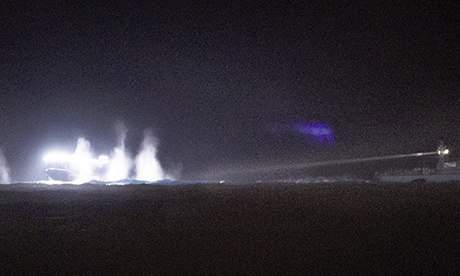The Observer (sister publication of the Guardian) devoted over 3400 words to a Sunday Magazine feature on the Israeli ‘assault’ on Gaza’s fishing industry.
The article was written by Alex Renton, a commentator on issues relating to global poverty, and was based largely on his first-person account with Palestinian fishermen on a vessel off the coast of Gaza.
We’re first introduced to the skipper of the fishing vessel in the following passage, which notes the putatively argumentative and abrasive nature of the people in the region.
It’s nearly dark. A couple of Israeli F-16 jets make twin scratches across the glow in the southeast, above the Egyptian border. “They own all the world,” mutters old Abu Nayim. But, for now, this feels like the most peaceful place you could find on this crowded coast, where there live some of the most disputatious people in the planet. There’s not much to tell you that this is a very risky way to catch fish.
Israeli Navy fires on vessel?
The passage above is followed by this photo – the same one used to illustrate the feature in the Observer print edition.
The caption reads:
Under fire: an Israeli gunboat fires on a Palestinian fishing boat/ Photograph: Gianluca Panella for the Observer
However, the illuminated water rising above the vessel would likely indicate that warning shots were fired into the water, near the vessel.
Israelis shoot the messenger?
The previous passage continues thus:
But his son, 22-year-old Mukhtar, is more anxious. He was on the boat on Monday when the Israeli navy put four bullets into the fibre-glass tender – a felucca – that’s bobbing behind us. He warns Gianluca, the photographer, who has his telephoto lens out – “If they see you poking that out, they will shoot at you.”
The quote – suggesting that the Israeli Navy has a habit of firing on photojournalists – is of course left un-examined by Renton.
“To go over six miles is death”?
They bob at anchor, their lights festive against the dark ocean. We’re close to the limit, as close as Abu Nayim dares, because the further out to sea the more sardines there are. “To go over six miles is death,” says Abu Nayim.
Actually, the most recent Palestinian civilians killed at sea were killed by the Egyptian Navy which, by all accounts, appears to be much more trigger-happy than the IDF when patrolling the seas.
Israeli Navy tosses live grenades at fishing nets?
The above passage continues thus:
Once, when he may have drifted over, an Israeli gunboat tossed a live grenade on to the nets. In the past month the fishing boats of Gaza have come under fire 10 times.
The charge, left unchallenged by the Observer contributor, that the Israeli Navy “tossed a live grenade on to the nets”, seems highly unlikely. And, we were unable to find any news sources making a similar claim.
Israeli Navy “curses the prophet”?
There’s another one-second blast of machine-gun fire. I can see the Israeli boat, so close to the fishing boat that its huge bow-wave gleams white in the lights. It’s circling the fishermen at high-speed, the wake throwing the fishing boat around. There’s shouting, through a megaphone. “The Israelis are insulting them,” says my interpreter. He doesn’t want to say the words. “They curse the prophet. They call the fishermen ‘son of a dog’. Tell them to go back to Palestine.”
Though there is no way to prove or disprove it, the claim – alleged by Renton’s interpreter – that Israelis cursed Muhammad through the boat’s megaphone again simply strains credulity.
Israel is destroying a once thriving fishing industry.
Not so long ago, Gaza had a thriving fishing industry. In 1994 the Oslo peace accords with Israel granted the Palestinian enclave, which was formed largely by refugees from the 1948 war that followed the founding of Israel, rights to fish up to 20 nautical miles offshore. That supported a fishing industry, according to a study done by the United Nations Foodand Agriculture Organisation (FAO), of some 4,000 boat-owning families. In 2004 they landed nearly 3,000 tonnes of fish. It was crucial to the nutrition of the 1.7 million people of the Gaza Strip, more than half of whom were dependent on food aid, even then.
It’s true that in 2004 Palestinians in Gaza landed nearly 3,000 tonnes of fish. However, the implication most would draw from this is that the tonnage has decreased every year since the Israeli blockade in 2006 – a claim easily disproven by figures provided by the Palestinian Central Bureau of Statistics (PCBS). As you can see, 2004 was a statistical anomaly. In 2003, the catch was roughly 1.5 tons, while in 2005 the catch was 1.8 tons. The catch in 2012 (just under 2.1 tons), as you can see in the PCBS chart below, was higher than in the three previous years.

Sewage.
Three miles or six, the industry’s collapse was inevitable. Fishing inshore is poor, and there’s an added danger because of Gaza’s failed sewage system. That was built to serve 400,000 people, and it has collapsed because of war damage and lack of materials to maintain it. Eighty-nine million litres of raw or partially treated waste water go straight into the sea every day. Last year the fishermen’s catch was less than half what it had been 10 years before
However, as Reuters reported last month, the sewage system’s failure is largely due to “Egypt’s…crackdown on cross-border smuggling tunnels that used to bring fuel in cheaply”, which forced Gaza’s waste water treatment plant to close. Additional factors leading to the fuel crisis include “political infighting” between Hamas and Fatah, a fact confirmed recently by a Hamas spokesperson (and one notable Gaza resident). If the sewage is indeed harming the Gaza fishing sector, it seems largely due to Egyptian restrictions and Palestinian infighting.
“Savage” Israelis?
Fishing is a harsh trade at any time, but here it is made rather more risky by the Israeli navy. As I witnessed, it makes its own arbitrary rules about the fishing zone, and exacts savage punishments for those who break them.
As Renton noted elsewhere in the article, the overwhelming majority of fishermen who go beyond the nautical limit are not harmed at all. Some are detained, while others are simply led back to an area closer to the Gaza coast. Renton wrote that “often fishermen will be taken to Israeli ports, blindfolded and handcuffed and questioned under ‘aggressive interrogation’ (the UN’s phrase) and then, after what may be several days’ detention, charged a fee to be transported back to the border.” However you can reasonably characterize such consequences, the word “savage” is clearly meaningless hyperbole.
The “World’s largest prison”?
For the people of Gaza, then numbering 1.5 million, normal life ended. Not since they were children had any of the young men I went fishing with left the “prison” – that’s David Cameron’s term.
Actually, per Twitter, that’s also a term fancied by Alex Renton:
It’s your fault the Jews are here.
In the penultimate paragraph there is this curious exchange between the journalist and one of the protagonists:
“You’re from Britain,” says the eldest son, Nayim. “It’s your fault. You invited the Jews to come from Europe to here, to take our land.” I demurred: it was more complicated than that. “What about the Balfour declaration?” he asked – referring to the note signed in 1917 by Britain’s foreign secretary AJ Balfour, declaring that Britain favoured the establishment of a Jewish state in Palestine. I thought about telling him that Balfour was my grandmother’s uncle, and that my own great-uncle fought Israeli terrorists in Jerusalem in 1947, as a British policeman. But what I said was: “It’s true, we are part of the history. We are responsible, too.”
There’s so much to unpack in this exchange between the ‘victim and accused’. Even more troubling than Renton’s failure to challenge the anti-historical charge that Jews were “invited” from Europe to take Palestinian land is his insistence on his own moral innocence. Renton is on the right side of history. His family fought the Jews.
Finally, someone wrote a response to Renton in the reader comment section beneath his article at The Observer. The response (to the passage we noted above) was inexplicably deleted by ‘CiF’ moderators. However, we were able to take a screen shot of the comment before its deletion. Here is the text:
Palestine once the Arabs (not in those days called Palestinians) made it clear they didn’t want Jewish immigrants, even though Ottoman censuses showed that Jerusalem had a Jewish majority from the first census in the mid-19th century.
Following bloody pogroms in Palestine by Arabs against Jews in the late 1920s and into the 1930s the pro-Arab British assured the Arab leadership that only a few thousand European Jews a year would henceforth be allowed in with an absolute total limit of 75,000. This was after Hitler had come to power and when Jews from across Europe were desperately seeking sanctuary somewhere, anywhere. Britain, the Dominions and colonies didn’t want most of them before, during or after the Holocaust. From the 1930s until 1948 the Royal Navy blockaded the coast of Palestine and turned back and even sunk (yes, sunk) merchant ships carrying Holocaust survivors to prevent them reaching ports. Thousands of Holocaust survivors from across Europe were interned by the British in camps on Cyprus.
Even before 1948 when Israel came into existence as a legal state and was immediately attacked by several Arab armies and air forces, there were Arab schemes to destroy any prosperity that Jews might generate even though thousands of Arabs from Jordan, Lebanon and Syria had settled in Palestine as Jews immigrated, attracted by the economic benefits Jews were developing. That is why as early as 1945 there was an Arab Boycott of Jews organization sponsored by the Arab League. (Not boycott of Israel, which didn’t then exist, but boycott of all things Jewish.)
As Alex Renton also knows, I am sure, approximately 850,000 Jews were forced to leave Muslim countries from 1948 onward and most of them tried to get to Israel. These were not Jews from Europe, these were Jews who lived in Arab countries, spoke Arabic and had absorbed Arab culture and had lived in North Africa and the Middle East since long before most of these regions were conquered by the Arabs and long before the arrival of Islam.
It is never explained why it seems to be a perfectly acceptable stance for some pro-Palestinians to support those Arabs who want to ‘remove’ Jews who live in Israel, even if they are from families who have always lived in what is now Israel. Both Hamas and the PA have publicly stated that no Jew will be permitted to live in ‘liberated’ Palestine.
Yes, Mr. Renton, it is indeed “a bit more complicated” than you suggest.
Related articles
- CiF Watch prompts correction to extremely misleading Livni quote at ‘Comment is Free’ (cifwatch.com)
- BBC’s Connolly exploits Mandela’s death for political campaigning (bbcwatch.org)
- Guardian Makes Catastrophic Error: Refers to Palestinian ‘Terrorists’ Without Quotes (algemeiner.com)
- Israel slouches ‘Left’? MK Aliza Lavie undermines the ‘Guardian narrative’ (cifwatch.com)
- Chris McGreal story on Mandela omits his (discredited) Guardian ‘expose’ on SA nukes (cifwatch.com)







